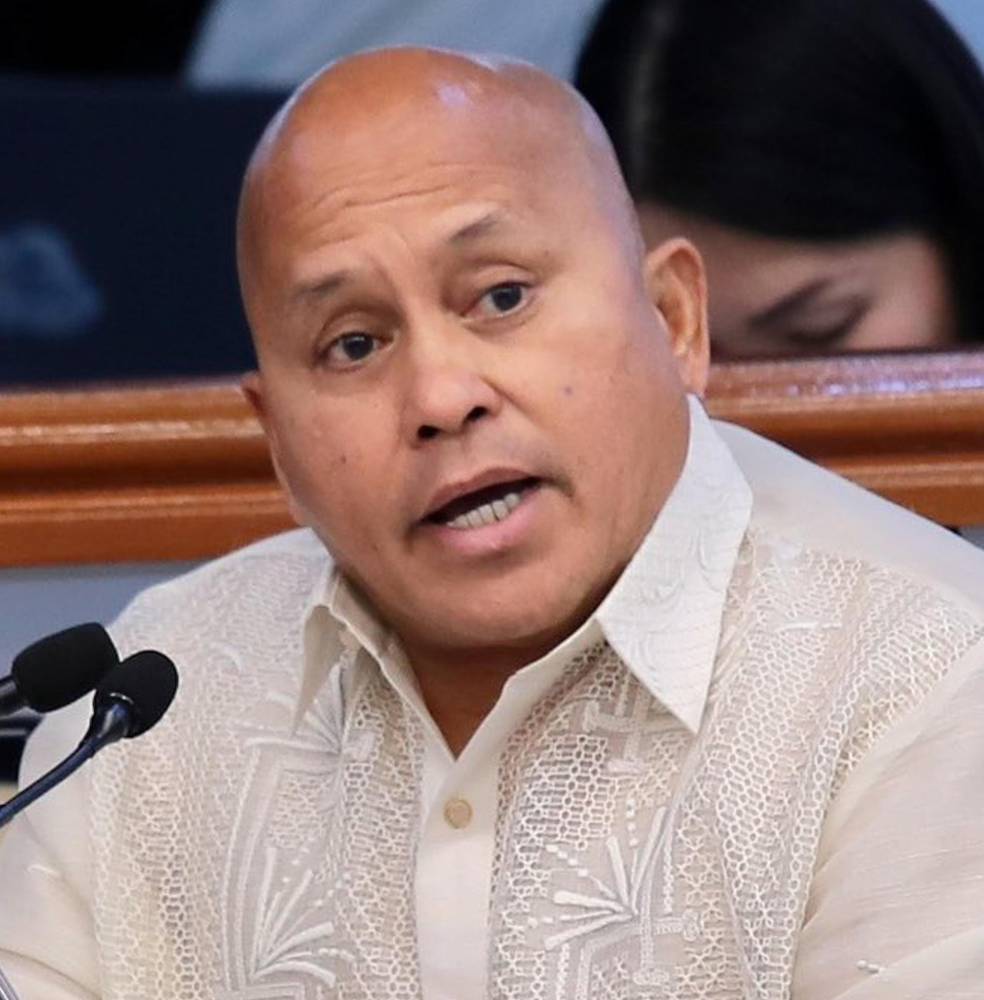
FILE PHOTO: Sen. Ronald “Bato” Dela Rosa during the Finance Subcommittee hearing on Monday, September 25, 2023. – Dela Rosa blasted Lt. Col. Jovie Espenido for his “concocted, scripted” claims about a quota and rewards system when the lawmaker was still chief of the Philippine National Police (PNP). (Voltaire F. Domingo/Senate PRIB)
MANILA, Philippines — Senator Ronald “Bato” dela Rosa blasted Lt. Col. Jovie Espenido for his “concocted, scripted” claims about a quota and rewards system when the lawmaker was still chief of the Philippine National Police (PNP).
In a phone interview with reporters on Friday, the former PNP top boss seemed incensed by Espenido’s allegations and asserted that someone “recruited” the former police chief of Albuera town in Leyte province to face the congressional probe.
“I swear to God, I never give any monetary consideration, any monetary reward for any accomplishment na magagawa ng PNP (done by the PNP),” dela Rosa said.
“Bumaliktad siya kasi may nag-recruit sa kaniya, I don’t know kung anong laman ng recruitment niya, hindi naman ‘yan basta-basta humarap doon kung walang mag-recruit sa kaniya, walang magkumbinsi, halata naman,” he added.
(He flip-flopped because someone recruted him. I don’t know what entails his recruitment, he will not face the lawmakers if no one recruited and convinced him, it’s obvious.)
READ: Espenido told: Pogo money used to reward anti-drug units
“At ‘yung kaniyang pagsisinungaling, tama na ‘yan as a package na ‘yan sa kaniyang pagbaliktad, ang dami niyang allegation na napakasinungaling eh. Eh ginagamit pa naman niya ‘yung Bibliya para magsalita tapos puro kasinungalingan ‘yung pinagsasabi,” he also said.
(And his lies are part of the package of his flip flopping. He has so many allegations that are full of lies. He even used the Bible in his testimony, only for him to spew lies.)
Espenido, citing a former mayor, has claimed before a public hearing at the House of Representatives that money from Philippine offshore gaming operators (Pogos), small town lottery, and intelligence funds were used to reward police officers who implemented the Duterte administration’s bloody anti-drug campaign.
But dela Rosa denied this.
“Yung sinasabi nila ang reward money daw nanggagaling sa Pogo, halata na ‘yung affidavit Espenido ay talagang concocted, scripted na design na talagang i-connect-connect ‘yung problema sa Pogo, problema sa war on drugs, problema sa EJK (extrajudicial killing) kuno ay gusto nila i-connect-connect,” the senator said.
(As to the reward money which supposedly came from Pogo, it’s obvious that his affidavit is a concocted, scripted design to connect the problems of Pogo, war on drugs or the supposed EJK, with each other.)
Dela Rosa continued: “Kasi 2016 pag-assign ko sa kaniya roon never pa man heard ang pangalan na Pogo, hindi pa man ‘yan sikat noon, ako mismo ignorante kung ano ‘yang Pogo, at that time, so bakit ngayon iko-connect niya ‘yan doon?”
(Because when I gave his assignment back in 2016, the term “Pogo” was unheard of, it’s not yet popular. I myself was ignorant as to what Pogo was, so why did he make such a connection now?)
READ: Espenido: Dela Rosa order for Albuera drug cleanup meant killing suspects
Espenido was recognized for taking down the illegal drug trade in Leyte’s Albuera town that was purportedly operated by Kerwin Espinosa.
He was likewise behind the filing of illegal drug trafficking and illegal possession of firearms complaints against Espinosa and his father, then-Albuera Mayor Rolando Espinosa Sr.
Espenido was also the one who convinced Espinosa Sr. to execute an affidavit and identify government and police officials who supposedly provided protection to his son’s illegal drug business which was deemed the biggest in Eastern Visayas.
But Espinosa Sr. was killed during an alleged shootout inside a sub-provincial jail in Baybay City, where he was later transferred to face the criminal charges.
Eventually, Espenido was assigned to Ozamis City in Misamis Occidental in Northern Mindanao.
In July 2017, Ozamiz City Mayor Reynaldo Parojinog Sr. and 14 others were killed by police serving arrest warrants on drug charges against the mayor. Parojinog was included in a Duterte “narcolist” of drug lords.
Under the administration of then-President Rodrigo Duterte, the country pulled out from the Rome Statute or the treaty that established the International Criminal Court. The Philippines’ withdrawal from the treaty in March 2018 took effect a year after or in March 2019.
Despite this, the ICC said it retains jurisdiction over alleged crimes in the Philippines – from November 1, 2011, to March 16, 2019 – while the country was still a state party to the Rome Statute.
Former President Duterte is being tagged as chief architect of the “drug war” which left 6,000 people killed, according to official government data. But the figure is far from estimates of the ICC and human rights watchdogs which pegged the drug war death toll between 12,000 and 30,000 from 2016 to 2019 alone, as they noted that several of these are extrajudicial killings.